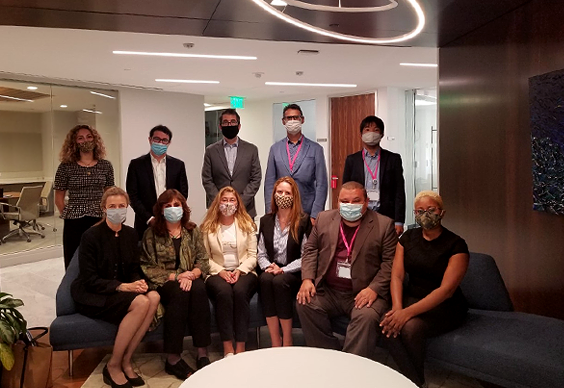December 13, 2021
Nomsa Ndongwe and Margarita Kalinina-Pohl
From 18 October to 19 October 2021, the James Martin Center for Nonproliferation Studies (CNS), organized a pilot session of the Washington Nonproliferation Seminar for five international experts from Bulgaria, Japan, and Ukraine who participated in the CNS Visiting Fellows Program in Monterey this fall. Offered by CNS since 1991, the Visiting Fellows program is one of the world’s first professional training programs devoted to WMD nonproliferation, arms control, and disarmament issues.

Visit to NTI Offices in Washington D.C.
Dr. Ekaterina Bogomilova from the University of World Economy in Bulgaria, Mr. Youshiyuki Shuzui from the Japan’s Ministry of Education, Culture, Sports, Science and Technology, Dr. Tetiana Melnyk, a research consultant at the Odessa Center for Nonproliferation (OdCNP) who is currently working at the European Parliament, Mr. Kostiantyn Ivaschenko from the Ministry of Foreign Affairs of Ukraine, and Mr. Vadym Ivko, a border guard officer from Ukraine – were a first cohort of CNS fellows to visit Washington DC as part of the new CNS project funded by the U.S. Department of State’s Bureau of International Security and Nonproliferation (ISN).
The overarching goal of the Washington Nonproliferation Seminar is to provide knowledge sharing and networking opportunities between mid-career international experts from national governments, academia, and civil society and their U.S. counterparts. The pilot session afforded these mid-career academics and experts from around the world an opportunity to learn more about nonproliferation and arms control from Washington D.C. based experts from CNS, the Department of State, Department of Energy, Nuclear Threat Initiative (NTI), Arms Control Association and the National Academy of Sciences.
The discussion topics covered during the visit ranged from the work conducted by NNSA Offices of Radiological Security (ORS) and International Nuclear Security (INS) and their current priority tasks, the future of small modular reactors (SMRs), and the importance of such international mechanisms as the Proliferation Security Initiative (PSI) and UNSCR 1540 to stop trafficking and curb the spread of WMD weapons and related technologies. The NTI team shared some of their recent work in the field of nuclear security, including its 2020 Nuclear Security Index and other publications. CNS open-source intelligence (OSINT) expert, Dave Schmerler, also gave an interactive presentation on using geospatial analysis for nonproliferation research and analysis. CNS Senior Fellow Miles Pomper spoke about the future of nuclear energy in the 21st century.
The fellows found the visit informative and instructive with regard to their overall professional development and their specific research areas as reflected in their testimonies below (quoted as written):
“The Washington DC visit was a great opportunity to meet with key stakeholders and actors in the nuclear non-proliferation field. Aside from being highly informative this trip allowed to establish contacts and broaden our networks as well as get a first ‘entry point’ to further be contacted with particular experts and professionals working on particular topics.”
“The visit to Washington was amazing. It was a rare opportunity to meet, to see and communicate together with both the representatives of the United States Government and Non-Government Organizations. This unique combination let me understand the current trends and challenges that concern the U.S. establishment from the different perspectives and the messages that I should bring home.”
“The speakers’ professionalism and passion on their subjects was duly noted and would be an example for me in future endeavors. I liked the diversity of topics brought to our attention even if some of them were not of my primer interest. That helped me to understand better how different topics might be connected to each other in terms of nonproliferation and illicit trafficking in particular. I also got a better understanding of US politics on some issues I was not aware of (e.g., small modular reactors).
“And the most striking outcome was the huge and important role of the civil society and NGOs playing in forming the US policy and acting as the pool of experts in critical spheres.”
For the US participants it was a chance to meet in person and network with emerging international experts. As some of them noted, they especially appreciated this opportunity during the COVID-19 pandemic when international visits and interaction still remain quite limited.
CNS plans to offer another Washington Nonproliferation Seminar to a dozen of mid-career international experts in the middle of 2022. The format of the meetings will be subject to COVID-19 conditions and restrictions.
